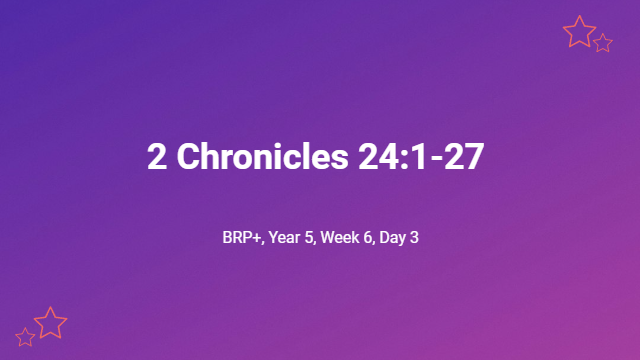2 Chronicles 24:1-27
Q.1. How great was Jehoiada’s influence over the king? What prompted Joash to restore the house of the Lord? How was the restoration of the Temple accomplished? – (2 Chr.24:1-14)
Joash was installed as king when he was only seven years of age. His reign was acceptable to God, as long as his adopted father Jehoiada was alive. Jehoiada even chose his wives for him. Why, then, did Joash decide to reform Israel’s worship? We get a clue that it occurred after he married. As an adult, the king was required to write out a copy of the Law of Moses – 18 “Now it shall come about when he sits on the throne of his kingdom, he shall write for himself a copy of this law on a scroll in the presence of the Levitical priests. 19 It shall be with him and he shall read it all the days of his life, that he may learn to fear the Lord his God, by carefully observing all the words of this law and these statutes (Dt.17:18-19). It is unlikely that Joash wrote out the Books of Moses when he first ascended the throne, because of his age. In fact, the requirement to copy out the Word of God by the young kings, probably explained why most of them started well, but drifted in later life. Joash’s reference to the levy for the maintenance of the Tent of Testimony suggested that God spoke to him about this failure in Judah (2 Chr.24:6 & 9; Ex.30:12-16). His action, based on the Book of Exodus, also confirmed that the king did not restrict himself to only copying the Book of Deuteronomy (as some have supposed). As is so often the case, when people were faithful, there was joy (2 Chr.24:10). The people gave. The priests acted as bankers, to further assist Joash and Jehoiada. This enabled the tradesmen to be paid for the repair work to the temple (2 Chr.24:11-14). It was a joint effort of priests and people.
Q.2. What made Jehoiada a great leader? How was his influence rewarded? Did his legacy endure? How did God respond to the changing circumstances? – (2 Chr.24:15-19)
Jehoiada was an extraordinary man of God, who impacted the nation for good throughout his long one-hundred-and-thirty-year life. His godliness was recognized and celebrated in life and death – They buried him in the city of David among the kings, because he had done well in Israel and to God and His house (2 Chr.24:16). Sadly, after the death of Jehoiada, the king was persuaded to turn to idols, and to abandon God (2 Chr.24:17-18). God, in love, delivered an appeal through His prophets – Yet He sent prophets to them to bring them back to the Lord; though they testified against them, they would not listen (2 Chr.24:19).
Q.3. What prompted Jehoiada’s son to speak against the nation? How was Zechariah’s faithfulness rewarded? How did Joash’s reign end? – (2 Chr.24:20-27)
One of the prophets whom God used was Jehoiada’s own son. He pleaded with the king and the people – Then the Spirit of God came on Zechariah the son of Jehoiada the priest; and he stood above the people and said to them, “Thus God has said, `Why do you transgress the commandments of the Lord and do not prosper? Because you have forsaken the Lord, He has also forsaken you.'” (2 Chr.24:20). Not only did they not listen to the prophetic voice, but King Joash silenced his voice by having him martyred. The Chronicler wrote this telling epitaph – Thus Joash the king did not remember the kindness which his father Jehoiada had shown him, but he murdered his son. And as he died, he said, “May the Lord see and avenge!” (2 Chr.24:22). God firstly punished the king and the faithless people by raising up the Arameans against Judah. God was not silent – When they had departed from him (for they left him very sick), his own servants conspired against him because of the blood of the son of Jehoiada the priest and murdered him on his bed. So he died, and they buried him in the city of David, but they did not bury him in the tombs of the kings (2 Chr.24:25). Joash was assassinated in reprisal for his treachery against Jehoiada’s family.

